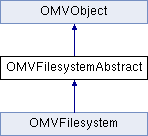|
OpenMediaVault
0.6 (Kralizec)
The open network attached storage solution
|
|
OpenMediaVault
0.6 (Kralizec)
The open network attached storage solution
|

Public Member Functions | |
| __construct ($id) | |
| refresh () | |
| exists () | |
| hasUuid () | |
| getUuid () | |
| hasLabel () | |
| getLabel () | |
| getType () | |
| getPartitionType () | |
| getPartitionScheme () | |
| getUsage () | |
| getPartitionEntry () | |
| getDeviceFile () | |
| getCanonicalDeviceFile () | |
| getDeviceFileByUuid () | |
| getStorageDeviceFile () | |
| getBlockSize () | |
| getMountPoint () | |
| getStatistics () | |
| hasPosixAclSupport () | |
| isMounted () | |
| mount ($options="") | |
| umount ($force=FALSE, $lazy=FALSE) | |
 Public Member Functions inherited from OMVObject Public Member Functions inherited from OMVObject | |
| __construct () | |
| getLastError () | |
Static Public Member Functions | |
| static | isMountPoint ($dir) |
| static | buildMountPath ($uuid) |
| static | hasFileSystem ($deviceFile) |
Protected Attributes | |
| $uuid = "" | |
| $type = "" | |
| $deviceFile = "" | |
| $label = "" | |
| $partEntry = NULL | |
| $usage = "" | |
Additional Inherited Members | |
 Protected Member Functions inherited from OMVObject Protected Member Functions inherited from OMVObject | |
| setLastError ($error) | |
| debug () | |
Abstract class implementing generic filesystems.
| OMVFilesystemAbstract::__construct | ( | $id | ) |
Constructor
| id | The UUID or device path of the filesystem, e.g.
|
|
static |
Get the directory where the filesystem should be mounted to. Note, this path is OMV specific: /media/<FSUUID>.
| uuid | The UUID of the filesystem. |
| OMVFilesystemAbstract::exists | ( | ) |
Checks if the filesystem exists.
| OMVFilesystemAbstract::getBlockSize | ( | ) |
Get the filesystem block size.
| OMVFilesystemAbstract::getCanonicalDeviceFile | ( | ) |
Get the canonical device file, e.g. /dev/root -> /dev/sde1
| OMVFilesystemAbstract::getDeviceFile | ( | ) |
Get the device path of the filesystem, e.g /dev/sdb1.
| OMVFilesystemAbstract::getDeviceFileByUuid | ( | ) |
Get the device path by UUID, e.g.
| OMVFilesystemAbstract::getLabel | ( | ) |
Get the filesystem label.
| OMVFilesystemAbstract::getMountPoint | ( | ) |
Get the mount point of the given filesystem.
| OMVFilesystemAbstract::getPartitionEntry | ( | ) |
Get the partition entry information.
| OMVFilesystemAbstract::getPartitionScheme | ( | ) |
Get the partition scheme, e.g. 'gpt', 'mbr', 'apm' or 'dos'.
| OMVFilesystemAbstract::getPartitionType | ( | ) |
Get the partition scheme, e.g. 'gpt', 'mbr', 'apm' or 'dos'.
| OMVFilesystemAbstract::getStatistics | ( | ) |
Get statistics from a mounted filesystem.
| OMVFilesystemAbstract::getStorageDeviceFile | ( | ) |
Get the device file of the storage device containing this file system. Example:
/dev/sdb1 => /dev/sdb
| OMVFilesystemAbstract::getType | ( | ) |
Get the filesystem type, e.g. 'ext3' or 'vfat'.
| OMVFilesystemAbstract::getUsage | ( | ) |
Get the usage, e.g. 'other' or 'filesystem'.
| OMVFilesystemAbstract::getUuid | ( | ) |
Get the UUID of the filesystem.
|
static |
Check if the given device file contains a file system.
| deviceFile | The devicefile to check. |
| OMVFilesystemAbstract::hasLabel | ( | ) |
Check if the filesystem has a label.
| OMVFilesystemAbstract::hasPosixAclSupport | ( | ) |
Does the filesystem support POSIX ACL.
| OMVFilesystemAbstract::hasUuid | ( | ) |
Check if the filesystem has an UUID.
| OMVFilesystemAbstract::isMounted | ( | ) |
Check if a filesystem is mounted.
|
static |
See if a directory is a mountpoint.
| @return | TRUE if the directory is a mountpoint, otherwise FALSE. |
| OMVFilesystemAbstract::mount | ( | $options = "" | ) |
Mount the filesystem by its device file or UUID.
| options | Additional mount options. Defaults to "". |
| OMVFilesystemAbstract::refresh | ( | ) |
Refresh the cached information.
| OMVFilesystemAbstract::umount | ( | $force = FALSE, |
|
$lazy = FALSE |
|||
| ) |
Unmount the filesystem.
| force | Set to TRUE to force unmount. Defaults to FALSE. |
| lazy | Set to TRUE to lazy unmount. Defaults to FALSE. |
 1.8.6
1.8.6